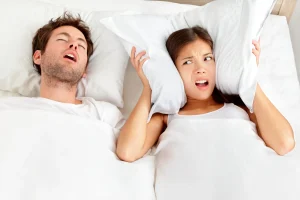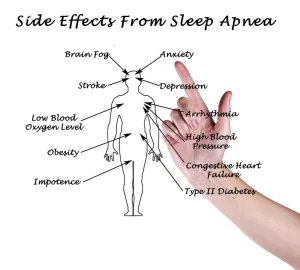Sleep apnea is a medical condition where you stop breathing for moments at a time throughout the night. Obstructive sleep apnea is a chronic condition that involves breathing pauses that moves you out of deep sleep into light sleep, overall affecting your entire night’s sleep cycle and causing you to be tired the next day with low mental capacity. The disturbance of sleep is caused by the relaxation of the muscles in the throat, which causes the windpipe to narrow, therefore restricting air to the lungs. Many times throughout the night someone experiencing obstructive sleep apnea will stop breathing from a few seconds to more than a minute. These repeated breathing pauses can happen up to 100 times throughout the night and will cause someone to awaken multiple times, distributing their full sleeping cycle.
Healthy sleep
A healthy night’s sleep is vital for mental stability, performance and energy. Essentially, sleeping allows us to recharge our battery to perform the demands each day presents us. A good night’s rest will help you look and feel your best. Adults are recommended to get between 7-9 hours of sleep each night, and children should get between 8-10 hours.
Unhealthy sleep
Unhealthy sleep consists of excessive daytime sleepiness, morning headaches, and mental loss. Lack of sleep is also known to contribute to weight gain. A sleeping disorder can be harmful to your overall health and well-being.

Sleep Apnea Fact #1

3 million new U.S. cases each year. In fact, most people with sleep apnea don't even realize they have a problem!
Sleep Apnea Fact #2

Gender and age directly correlate with sleep apnea. In fact, it is more common in men over the age of 50 than women.
Sleep Apnea Fact #3

Total economic cost of "tiredness" comes to approximately 43-56 billion dollars in health care costs.
It can be hard to determine if you have sleep apnea on your own since most symptoms occur in your sleep. If possible, ask a partner or record your own sleep habits. Listen for random pauses followed by a gasp or snort. Other sure signs that should be assessed by a dentist include waking up frequently to urinate, waking up abruptly to gasping and feeling out of breath, Excessive Daily Sleepiness (EDS), or Non-Restorative Sleep (NRS).
Other common symptoms include:
- Decreased memory, concentration or ability to perform
- Constant fatigue
- Headaches and/or dry mouth upon waking up
- GERD (gastroesophageal reflux), similar to acid reflux
- Personality changes such as increased irritability, mood swings or depression
- Dozing off within seconds of being inactive — ex. falling asleep at a stop light
While most cases of obstructive sleep apnea are attributed to health problems, some can also be attributed to genetic traits. Hispanics, Pacific Islanders and Black people are genetically at a higher risk for sleep apnea. Generally, males are at higher risk than women, especially over the age of 65. As you age, the soft tissue in your throat will lose its strength and seep into your esophagus. The size of your neck circumference (>17” for men, >16” for women) can also contribute to sleep apnea. If you live in the Houston, Texas area and suffer from sleep apnea contact our dental office to learn about the popular dental treatments for sleep apnea.
Other risk factors that increase the likelihood of obstructive sleep apnea include:
- Hypertension
- Heart Disease/Failure
- Stroke
- High Blood Pressure
- Obesity
- Diabetes
- Endocrine and Metabolic Disorders
- An estimated 18 million Americans have reported suffering from sleep apnea, and at least another 10 million are estimated to have undiagnosed sleep apnea.
- 9% of middle-aged women and 25% of middle-aged men suffer from obstructive sleep apnea.
- 43% of patients with mild obstructive sleep apnea and 69% of patients with severe obstructive sleep apnea have hypertension.
- 65% of stroke patients have obstructive sleep apnea or some sort of “sleep-disordered breathing.”
- People afflicted with sleep apnea are 6 times more likely to die in a car accident.
Houston, Texas boasts a diverse group of people and is considered the most populous city in all of Texas, and the 4th most populous city in the U.S. It’s very likely that residents of the Houston area suffers from obstructive sleep apnea and don’t even know it!

Dental Oral Appliances: Mouthpieces
Patients whose main symptom is snoring or those who have mild obstructive sleep apnea are referred to Mandibular Advancement Devices (MAD), or oral mouth pieces, instead of continuous positive airway pressure breathing machines (CPAP) for a more comfortable sleep. The side effects are little to none, with patients’ only complaint being discomfort while getting used to the appliance. This has become the most popular treatment option for sleep apnea. Custom dental oral appliances are now available in the Houston, Texas area!
What is a Mandibular advancement device?
MADs have been found to be equally as effective as CPAP in lowering blood pressure and reducing risk factors associated with obstructive sleep apnea. Patients prefer MAD to CPAP because it is easier to put on and take off, and is less obstructive to others who may be sleeping with you, or in close proximity. It is also easily transferable, allowing a comfortable sleep wherever your travels take you.
How it works
Mandibular advancement devices treat snoring and sleep apnea by moving the lower jaw forward and tightening the soft tissue and muscles of the upper airway to prevent obstruction of the airway. Keeping the muscles tight prevents the tissues of the upper airway from vibrating as air passes over them.
Laser Dentistry to Treat Sleep Apnea
Laser dental treatments can help you sleep better! A soft tissue laser treatment is known to help treat sleep apnea and improve comfort. The painless procedure reduces the risk of excessive bleeding, minimizes damage, lowers the risk of bacterial infections, and overall improves patient experience. Laser dentistry can “reshape” the throat by removing the extra soft tissue that relaxes and clogs your windpipe while you sleep.
How does it work?
The tissue overgrowth will be removed through a light beam, opening up the airway to improve your breathing patterns. The procedure is usually painless because the laser only reaches the cellular level. The laser beam also helps reduce bacterial infections by sterilizing the surface it touches. If you are interested in improving your sleep and think you may suffer from sleep apnea, you are in good hands! Dr. Burton has many years of experience and is a licensed dental professional to provide you the care you need for sleep apnea.
Dentists around the country are making the switch from CPAP to Mandibular advancement devices, including Greenspoint Dental in the Houston, Texas area. Dr. Burton is an accomplished dental surgeon who has the experience needed to properly fit the oral devices to her patients’ individual mouths. Contact Greenspoint Dental for an appointment to properly diagnose your sleep apnea and schedule a fitting for your custom sleep apnea oral treatment device. Dentists around the country are making the switch from CPAP to Mandibular advancement devices, including Greenspoint Dental in the Houston, Texas area. Dr. Burton is an accomplished dental surgeon who has the experience needed to properly fit the oral devices to her patients’ individual mouths. Contact Greenspoint Dental for an appointment to properly diagnose your sleep apnea and schedule a fitting for your custom sleep apnea oral treatment device. Dentists around the country are making the switch from CPAP to Mandibular advancement devices, including Greenspoint Dental in the Houston, Texas area. Dr. Burton is an accomplished dental surgeon who has the experience needed to properly fit the oral devices to her patients’ individual mouths. Contact Greenspoint Dental for an appointment to properly diagnose your sleep apnea and schedule a fitting for your custom sleep apnea oral treatment device.
Schedule an Appointment with us